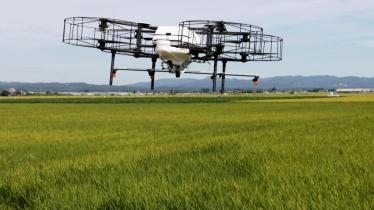Garuda Aerospace, a market leader in the drone tech segment, plans to cater to more international markets soon, aiming to export 10,000 drones to around 50 countries by 2025. The Chennai-based firm exports 500-1,000 drones at present to around five countries.
“I believe developing countries hold much more market potential with the rural population predominantly engaged in agriculture,” Agnishwar Jayprakash, founder and CEO of Garuda Aerospace, said in an interaction with FE. In January, the startup formed a strategic partnership with Spirit Aeronautical Systems, a leading Greek manufacturer, to expand market reach and facilitate technology exchange.
Garuda Aerospace, a drone manufacturer and drone-as-a-service (DaaS) provider, caters to agriculture, surveillance and mapping, delivery and logistics and defence industries. It is largely focused on the agri drone sector, claiming to have a 55% market share in the space, and a 25% market share across all drones in India. The Series A startup recorded `110 crore in operating revenue in FY24, up from `47 crore in FY23, and `15.31 crore in FY22. The company has been profitable in the last three years.
Talking about the heightened focus today on profitability, unit economics and corporate governance, Jayprakash said all these aspects are critical to determining the longevity of a startup. “Laying a solid foundation for sustainable growth is the key, which can be understood from profitability and strong unit economics. Market potential and technology behind a business are other important factors,” he added.
Currently, Garuda Aerospace manufactures over 30 different types of drones and offers more than 50 types of services. These include precision agriculture spraying, upgrading services for industry 4.0, structural damage inspections, warehouse management for companies like Flipkart, delivery services, seed dispersal, solar panel cleaning, project monitoring, and drone delivery of medicines for hospitals. It has forged many partnerships in the industry, including with Spirit Aeronautical Systems and Hindustan Aeronautics.
Garuda Aerospace commenced operations in 2015 with a team of five. Today, it has scaled to 200 members with a fleet of over 400 drones and 500 pilots operating in 84 cities. The startup competes with Aarav Unmanned Systems, ideaForge, DeTech Technologies, DroneAcharya, Skylark and a few others in the space.
Recently, the startup secured its first order from Isro for Quadcopter drones. “Built to endure the extremes, our drones can be customised to withstand the harsh conditions of high altitudes, making them ideal for tasks like surveying, mapping, and sample collection. That’s why we were offered the order,” the founder said.
The company’s association with Isro started in 2021 during the peak of the pandemic, when Garuda Aerospace’s drones delivered essential supplies to Isro officials residing in quarters in Sriharikota and sanitised the premises. “This served as a powerful testament to the ability of drone technology to serve society in times of crisis,” Jayprakash said.
Gaurda’s drones are being used in disaster response for earthquakes and floods, particularly in Assam, Gujarat, Kerala, and Andhra Pradesh. They were used for disaster relief when the Chamoli glacier burst in Uttarakhand as well.
The opportunity in India’s agri drone sector is huge. According to a Frost and Sullivan report, drone usage in India within the agriculture market will grow at 38.5% CAGR and reach $121.43 million by 2030. To tap into this, the company primarily focuses on the agri segment with its ‘kisan drones’ that leverage artificial intelligence (AI) and machine learning (ML). Kisan drones, the company says, ensure 20-25 uniform precision spraying per day with 70% savings on pesticides and 80% savings on water, resulting in a crop yield increase of over 26%. It also guarantees 80% autonomous flying, requiring minimal supervision from the pilot. These drones also have in-built tech features that provide for different crops and give automatic solutions on dilution ratios to tackle 50 types of diseases. All these recommendations are tested and cleared by 300 senior ICAR scientists, the company says.
Garuda Aerospace is in discussions with bankers for a potential IPO and plans to raise a pre-IPO round soon. “An IPO will enable us to expand operations across India and establish drone hubs and training and experience centres. We will invest more in research and development and ultimately provide a more comprehensive set of services for the consumers,” Jayprakash said.
According to data from Tracxn, Indian drone startups attracted $49.7 million in FY23 across 20 rounds, as compared to $25 million across 23 rounds in FY22, and $11.2 million in FY21.
